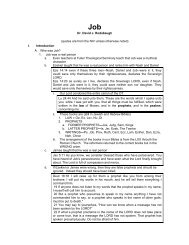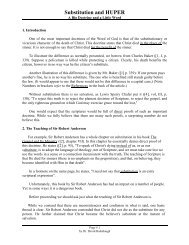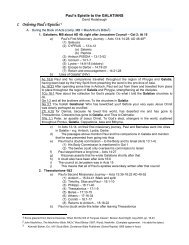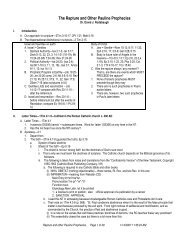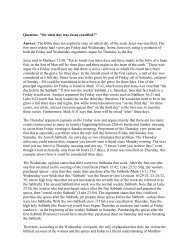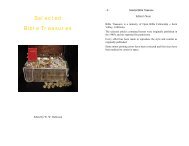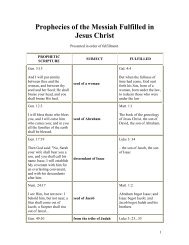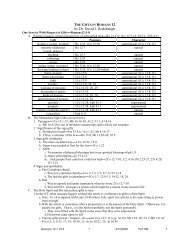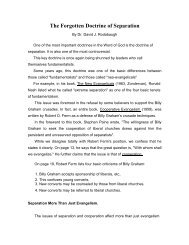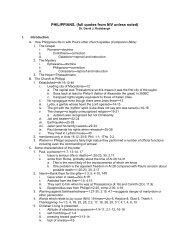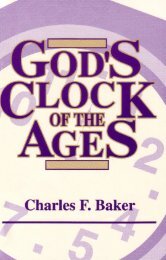Create successful ePaper yourself
Turn your PDF publications into a flip-book with our unique Google optimized e-Paper software.
When <strong>the</strong> lots were cast, Peter led <strong>the</strong> church to ordain an apostle God had not chosen (v.26). It wastrue, <strong>the</strong> Lord's intention was for his church to have twelve apostles, twelve and only twelve. David'sprophecy must be fulfilled. Ano<strong>the</strong>r apostle must take Judas' place. But, like <strong>the</strong> o<strong>the</strong>rs, he must bepersonally chosen and ordained to <strong>the</strong> <strong>of</strong>fice by Christ himself. The Lord had not chosen Justus orMatthias for this <strong>of</strong>fice. He had chosen Paul (I Cor. 15:8).How could Peter have made such a mistake? He sought to determine <strong>the</strong> will <strong>of</strong> God by casting lots.Like David, he made <strong>the</strong> mistake <strong>of</strong> seeking to determine <strong>the</strong> will <strong>of</strong> God by seeking <strong>the</strong> will <strong>of</strong> <strong>the</strong>people (I Chron. 13:1-4). He tried to accomplish <strong>the</strong> will and work <strong>of</strong> God by <strong>the</strong> wisdom and energy<strong>of</strong> <strong>the</strong> flesh! As a result, Matthias was chosen to do what God had not gifted him to do. So far as weknow, he never preached a sermon or wrote an epistle. We can only speculate about what became <strong>of</strong>him. But his name is never mentionb) At this time Paul was <strong>the</strong> chief persecutor <strong>of</strong> <strong>the</strong> believers and <strong>the</strong> twelve were neededfor <strong>the</strong> events <strong>of</strong> Pentecost!c) Often people jump to this conclusion because <strong>the</strong>y do not understand Paul’s ministry.They do not differentiate between <strong>the</strong> earthly program and <strong>the</strong> heavenly program!d) Notice that David did not cast lots but ‘took a vote’ <strong>of</strong> <strong>the</strong> people. Thus this commenthas nothing to do with <strong>the</strong> situation here.e) J Vernon McGee’s comments 6vv. 15-26 — The election to choose a successor to Judas Iscariot is conducted by Peter without <strong>the</strong> presenceand guidance <strong>of</strong> <strong>the</strong> Holy Spirit — <strong>the</strong> Holy Spirit had not yet come. Matthias was evidently a good man whomet <strong>the</strong> requirements <strong>of</strong> an apostle and apparently was an apostle. The Holy Spirit, however, ignored him, forhe never is mentioned again in <strong>the</strong> Scriptures. The successor, we believe, to Judas Iscariot was Saul <strong>of</strong>Tarsus, chosen personally by <strong>the</strong> Lord Jesus Christ (Galatians 1:1).f) Notice that this author refers to it as an election. This has nothing to do with castinglots.g) He takes Gal 1:1 to teach that God chose him to be one <strong>of</strong> <strong>the</strong> twelve but he doesn’trealize that Paul also says in Gal 1:11 & 12 that God gave him a different message!h) Indeed, Paul is not counted with <strong>the</strong> twelve EVER.At least two qualifiedAct 1:23 So <strong>the</strong>y proposed two men: Joseph called Barsabbas (also known as Justus) and Matthias.Act 1:24 Then <strong>the</strong>y prayed, "Lord, you know everyone's heart. Show us which <strong>of</strong> <strong>the</strong>se two you have chosenAct 1:25 to take over this apostolic ministry, which Judas left to go where he belongs."Act 1:26 Then <strong>the</strong>y cast lots, and <strong>the</strong> lot fell to Matthias; so he was added to <strong>the</strong> eleven apostles.Notice two factsi) Paul did not qualify at all -- periodj) Casting lots was a common and proper way in <strong>the</strong> OT to make a decision (NIV) 7k) Indeed, it is a part <strong>of</strong> <strong>the</strong> sovereignty <strong>of</strong> God that, no matter what you do, God hasforeordained <strong>the</strong> outcome! So, this was a manifestation <strong>of</strong> <strong>the</strong>ir faith.Act 1:26He was numbered (sunkatepsēphis<strong>the</strong>̄). To <strong>the</strong> Jews <strong>the</strong> lot did not suggest gambling, but “<strong>the</strong> O.T. method <strong>of</strong>learning <strong>the</strong> will <strong>of</strong> Jehovah” (Furneaux). The two nominations made a decision necessary and <strong>the</strong>y appealedto God in this way. This double compound sunkatapsēphizō occurs here alone in <strong>the</strong> N.T. and elsewhere only inPlutarch (Them. 21) in <strong>the</strong> middle voice for condemning with o<strong>the</strong>rs. Sunpsēphizō occurs in <strong>the</strong> middle voice inAct_19:19 for counting up money and also in Aristophanes. Psēphizō with dapanēn occurs in Luk_14:28 forcounting <strong>the</strong> cost and in Rev_13:18 for “counting” <strong>the</strong> number <strong>of</strong> <strong>the</strong> beast. The ancients used pebbles(psēphoi) in voting, black for condemning, white (Rev_2:17) in acquitting. Here it is used in much <strong>the</strong> samesense as katarithmeō in Act_1:17.6 J. Vernon McGee, Notes and <strong>Outline</strong>s ACTS7 Robertson’s Word Pictures, eSwordActs Page 8 January 23, 2011 18:07



